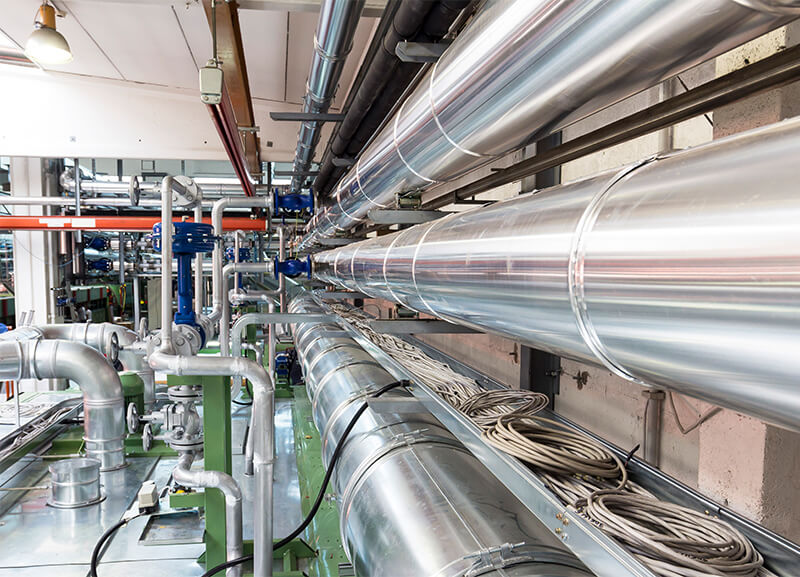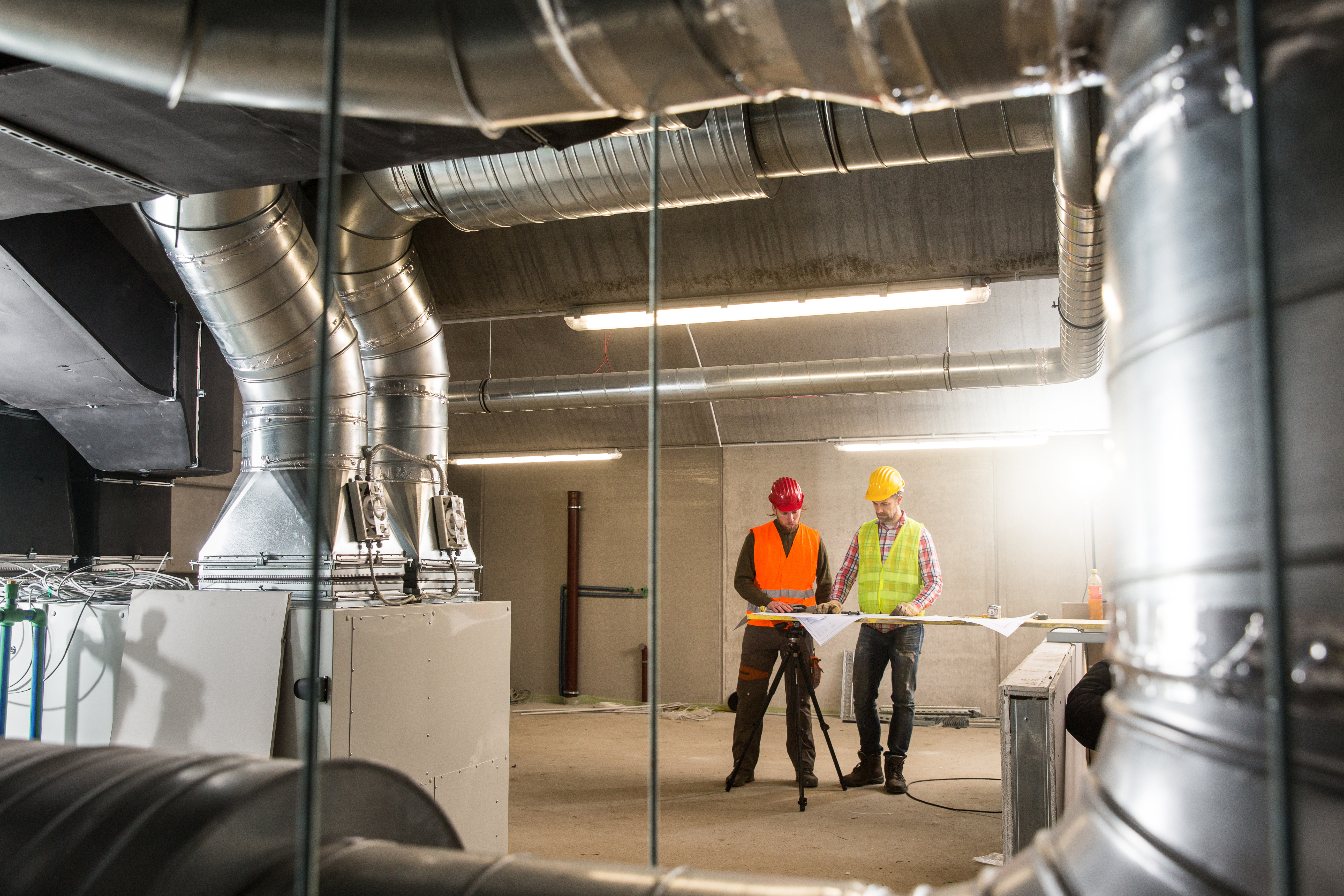Find out how HVAC experts recommend innovative heating and cooling solutions
Wiki Article
Discovering the Necessary Elements of an Efficient Cooling And Heating System
A reliable a/c system is built on a number of essential elements that function in consistency. Each component, from the thermostat to the ductwork, plays a vital role in preserving convenience and energy performance. Comprehending these aspects is critical for maximizing efficiency and boosting interior air quality. As one takes a look at these components, the complex connections in between them disclose insights into boosting overall system efficiency. What certain variables contribute most to this effectiveness?The Role of the Thermostat in Heating And Cooling Efficiency

Although frequently neglected, the thermostat plays a vital duty in the efficiency of HVAC systems. HVAC experts. This small tool functions as the main nerve center, controling temperature setups and making certain ideal comfort within an area. By accurately sensing the ambient temperature level, the thermostat interacts with the ventilation, heating, and air conditioning devices to keep the desired environment
An effective thermostat minimizes power usage by turning on the a/c system just when required, therefore avoiding excessive heating or air conditioning. Modern wise and programmable thermostats improve this effectiveness further by enabling customers to set routines and from another location readjust settings, adapting to daily routines.
The positioning of the thermostat is important; inappropriate location can lead to imprecise temperature level analyses, resulting in ineffective operation. In general, a well-functioning thermostat not just enhances convenience yet additionally adds markedly to power savings and the long life of the heating and cooling system.
Understanding the Importance of Air Filters
Air filters offer an essential feature in a/c systems by assuring that the air circulating within a room remains healthy and balanced and tidy. These filters trap dust, irritants, and various other contaminants, preventing them from being recirculated throughout the environment. By catching these bits, air filters contribute to boosted indoor air quality, which can considerably benefit residents' wellness, specifically those with allergic reactions or respiratory system conditions.Furthermore, maintaining tidy air filters boosts the efficiency of cooling and heating systems. Clogged up filters can limit air flow, triggering the system to work more challenging to maintain wanted temperatures, leading to boosted power consumption and greater energy costs. Frequently changing or cleaning filters is an essential upkeep step that can prolong the life-span of heating and cooling tools. Inevitably, understanding the value of air filters enables house owners and building managers to take positive procedures to ensure a well-functioning, effective cooling and heating system that promotes a safe and comfy indoor setting.

The Performance of the Furnace and Heat Pump
Furnaces and heatpump are critical parts of a/c systems, in charge of supplying warmth throughout colder months. Heaters operate by heating air via combustion or electrical resistance, then distributing it throughout the home via air ducts. They normally supply quick home heating and can be sustained by gas, electrical energy, or oil, relying on the system type.Alternatively, heatpump move warmth instead than generate it. They remove warm from the outside air or ground, even in reduced temperatures, and transfer it indoors. HVAC experts. This dual capability allows warm pumps to also supply cooling in warmer months, making them functional choices for year-round climate control
Both systems require correct maintenance to assure efficiency and durability. While heating systems master extreme chilly, warmth pumps can be useful in moderate environments. Recognizing their distinct functionalities help property owners in picking the most appropriate alternative for their heating needs.
Checking Out the Cooling Device
The a/c system is a vital element of a/c systems, available in various types to fit different requirements. Understanding the effectiveness scores of these devices is vital for making educated selections concerning power consumption and cost. This section will explore the diverse kinds of air conditioning system and clarify how performance scores impact efficiency.Kinds Of Air Conditioners
While different variables influence the selection of cooling systems, understanding the different types available is critical for property owners and building supervisors alike. Central air conditioning conditioners are designed to cool entire homes or structures, using a network of ducts for airflow. Home window units offer a more localized service, ideal for solitary spaces or tiny spaces. Mobile a/c unit provide adaptability, permitting customers to move the unit as required. Ductless mini-split systems are an additional choice, integrating the efficiency of main systems with the ease of zoning, as they need no ductwork. Geothermal systems harness the planet's temperature for energy-efficient air conditioning. Each kind comes with distinct benefits, making educated selections important for efficient environment control.
Efficiency Ratings Explained
Recognizing effectiveness scores is important for choosing the right cooling system, as these metrics supply understanding into the system's performance and power usage. One of the most usual ranking for ac system is the Seasonal Power Effectiveness Proportion (SEER), which gauges the cooling outcome throughout a normal air conditioning season split by the total electric power input. A higher SEER indicates better effectiveness. Additionally, the Power Efficiency Ratio (EER) is used for gauging efficiency under certain conditions. One more important metric is the Power Star qualification, which indicates that a device fulfills rigorous power performance standards. By evaluating these scores, customers can make informed selections that not only maximize convenience yet additionally decrease power expenses and environmental influence.The Significance of Ductwork and Air flow
Reliable ductwork design and airflow monitoring play vital duties in the total efficiency and efficiency of a/c systems. Appropriate ductwork assurances that conditioned air is dispersed equally throughout a space, reducing temperature level fluctuations and improving convenience. Properly designed air ducts lessen resistance to air movement, reducing the workload on a/c devices and eventually reducing power usage.Air movement monitoring involves strategically placing vents and registers to enhance the flow of air. This avoids common concerns such as warm or chilly spots, which can occur when air movement is obstructed or improperly well balanced. Furthermore, the best air duct products and insulation can additionally enhance effectiveness by reducing warm loss or gain during air transportation.
A reliable ductwork system not only adds to energy savings however can also extend the life expectancy of heating and cooling equipment by lowering unneeded stress (HVAC experts). Understanding the value of ductwork and air movement is vital for accomplishing peak Heating and cooling system efficiency.
Routine Maintenance Practices to Boost Performance
Routine upkeep techniques are crucial for making sure peak performance of cooling and heating systems. These methods consist of regular inspections, cleansing, and essential fixings to keep the system running successfully. On a regular basis changing air filters is vital, as clogged up filters can block airflow and decrease performance. Furthermore, specialists need to inspect and tidy evaporator and condenser coils to stop getting too hot and power wastage.Annual expert evaluations are additionally recommended, as skilled technicians can recognize prospective problems prior to they escalate. Lubing relocating parts decreases deterioration, adding to a much longer life expectancy for the system. Making certain that the thermostat functions correctly help in maintaining perfect temperature control.
Often Asked Questions
Exactly how Typically Should I Replace My Thermostat?
Thermostats need to generally be changed every 5 to 10 years, depending upon use and modern technology advancements. Routine checks are advisable to guarantee peak performance, especially if experiencing inconsistent temperature control or boosted power expenses.What Size Air Filter Is Best for My Cooling And Heating System?
The very best size air filter for an a/c system differs by device layout. Generally, it's crucial to seek advice from the proprietor's guidebook or examine the existing filter dimensions to guarantee peak efficiency and air high quality.Can I Install a Heatpump Myself?
Mounting a heatpump individually is possible for skilled individuals, but it requires expertise of electrical systems and neighborhood codes. Hiring an expert is advised to ensure correct setup here and excellent system efficiency.How Do I Know if My Ductwork Is Reliable?
To figure out ductwork effectiveness, one should look for leakages, measure air movement at vents, inspect insulation top quality, and assess temperature differences in between supply and return ducts. Specialist evaluations can offer extensive insights into overall efficiency.What Are Indications My A/c Requirements Immediate Upkeep?
Indications that an a/c system requires immediate maintenance consist of unusual sounds, inconsistent temperatures, enhanced energy costs, unpleasant smells, and regular cycling. Dealing with these concerns immediately can avoid more damages and warranty top system efficiency.Air filters serve a vital feature in HVAC systems by assuring that the air circulating within a room remains healthy and balanced and clean. In addition, maintaining tidy air filters boosts the efficiency of A/c systems. Ductless mini-split systems are another choice, incorporating the efficiency of main systems with the convenience of zoning, as they require no ductwork. Understanding performance scores is necessary for choosing the ideal air conditioning device, as these metrics give insight into the system's efficiency and energy consumption. The ideal dimension air filter for a Heating and cooling system varies by system design.
Report this wiki page